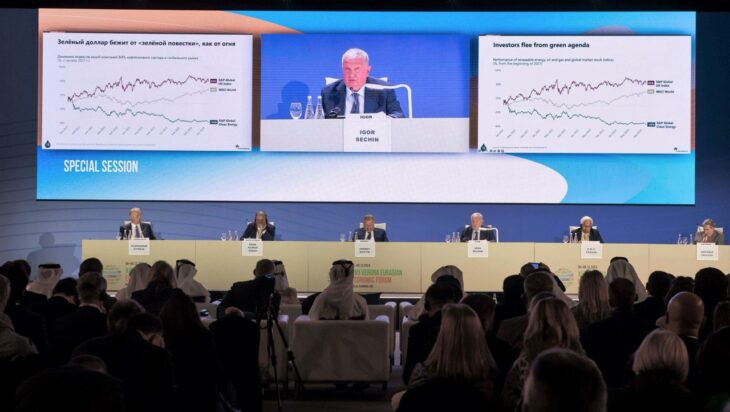Rosneft address on the Global Energy Landscape at XVII Verona Eurasian Economic Forum held in Ras Al Khaimah

The XVII Verona Eurasian Economic Forum brought together representatives of governments, businesses, and civil society organizations from Europe and Asia, focusing on strengthening Eurasian cooperation.
Rosneft PJSC, Chief Executive Officer, Igor Sechin, Russia’s largest oil producers addressed the XVII Verona Eurasian Economic Forum with a report titled “Farewell to Illusions: World Energy in the Thucydides Trap.” and cleverly dispelled myths about green energy, whilst predicting an increase in the demand for fossil fuels.
During his report, Igor Sechin, Chief Executive Officer of Rosneft PJSC, noted that the modern energy system is wholly based on fossil fuels, which currently accounts for more than 80% of all primary energy consumed worldwide. Oil, gas and coal are indispensable in the life of modern man and society: fossil fuels are easily transportable.

For example, the amount of energy that can be moved 1000 miles for just under one dollar-for pipeline oil it’s up to 4.4 megawatt-hours, for pipeline gas it’s up to 1.2 megawatt-hours, while for hydrogen this figure will be only a fraction of 0.2 megawatt-hours.
Drawing on research by McKinsey and renowned scientists, Sechin emphasized the superior energy density of fossil fuels: diesel is nearly 30 times more efficient than hydrogen, while natural gas surpasses wind and solar by 270 times.
Global Demand for Fossil Fuels Expected to Rise
Contrary to popular predictions, Sechin argued that the peak demand for fossil fuels remains distant. He noted that raising living standards in developing nations to even half the level of developed nations would require nearly doubling global oil production. Investment bank JPMorgan estimates global oil demand will increase by six million barrels per day by 2035, driven by emerging economies such as India.
“Oil accounts for more than 30% of global energy consumption, coal 25%, and gas 22%,” Sechin remarked, adding that fossil fuels remain the backbone of the global energy system.
Challenges of the Energy Transition
Sechin critiqued the rapid push to abandon fossil fuels, citing historical climatic cycles and the immense financial and structural hurdles to transitioning to low-carbon energy sources. Achieving the Paris Agreement goals by 2050 would require $70 trillion in investments and a tenfold increase in low-carbon electricity generation capacity—a feat Sechin described as “unrealistic.
He further noted the challenges faced by green economy companies, with many failing to meet their goals on time, causing investor hesitancy.
Quoting the ancient Greek historian Thucydides, Sechin drew parallels to today’s geopolitical landscape, cautioning against the consequences of hegemonic competition.
The head of the corporation also said that green economy companies are objectively not able to achieve their goals on time, so many investors simply do not want to work with them.
In the context of reconsidering our own approach to the “green agenda”
Oil giants such as Chevron, BP and Shell are halting projects to produce alternative fuels, Denmark’s largest energy company Orsted even canceled the construction of a methanol plant due to low demand.
Sechin called for a pragmatic approach to the energy transition, acknowledging the continued role of fossil fuels while addressing global energy demands responsibly.
Huge Potential for Eurasian Cooperation
“I am convinced that the potential of our cooperation is enormous, and we are only at the beginning of the road to its implementation,” Igor Sechin said and quoted the first president of the United Arab Emirates, “Unity is the path to strength, honor, invulnerability, and common good.”
Igor Sechin wished productive work to all Forum participants and personally thanked Sheikh Mohammed bin Zayed Al Nahyan, the President of the UAE, and Sheikh Saud bin Saqr Al Qasimi, the Emir of Ras Al Khaimah, for their hospitality and informative content of the event program.



